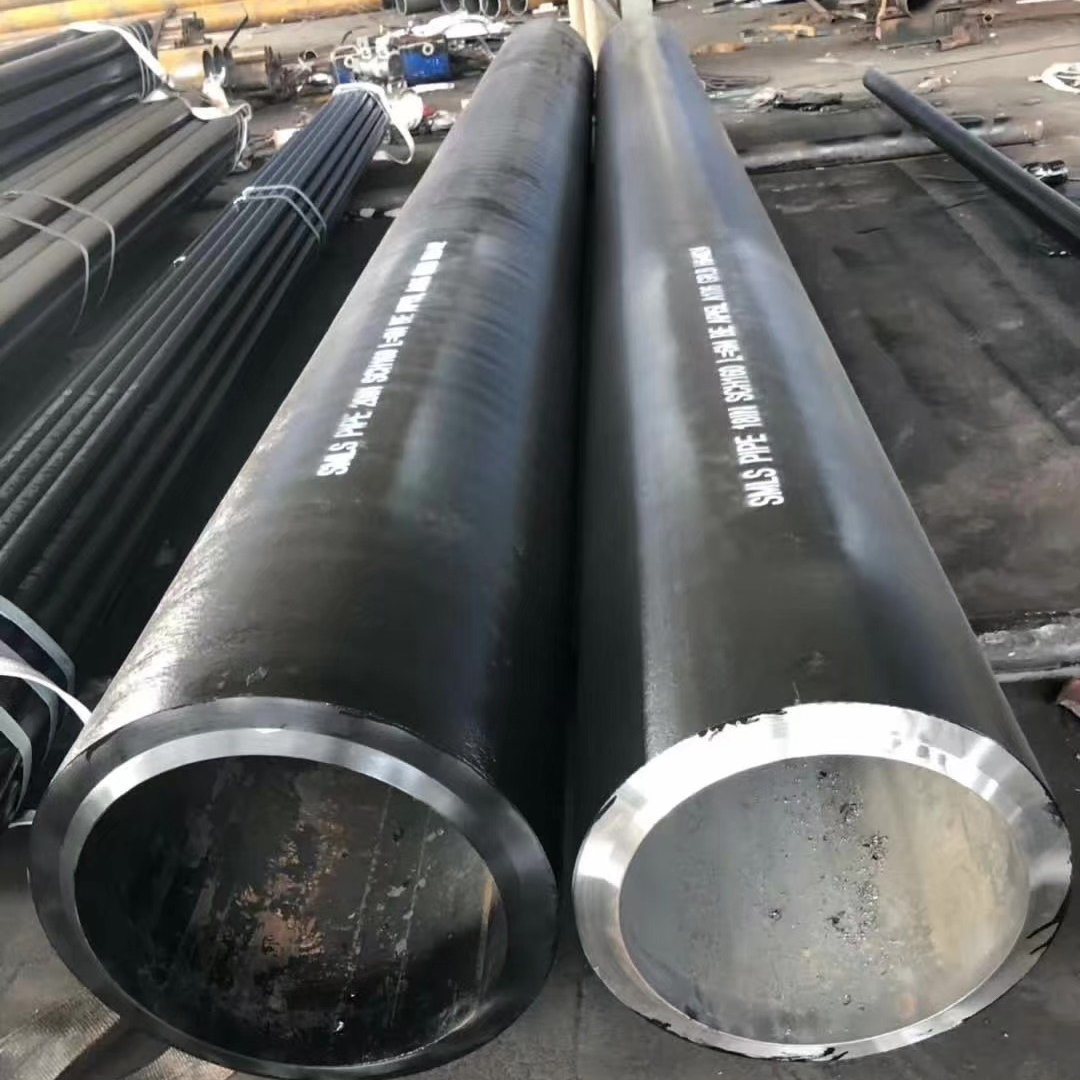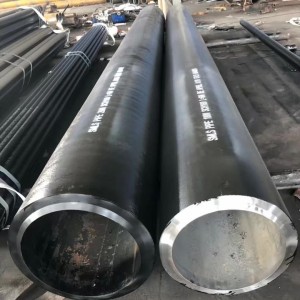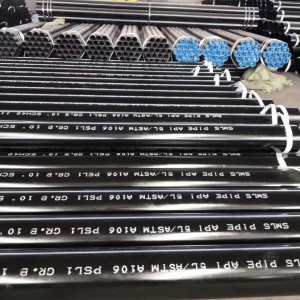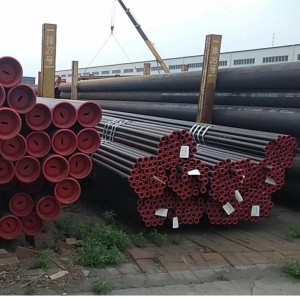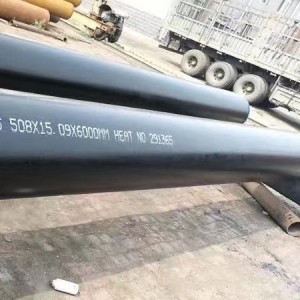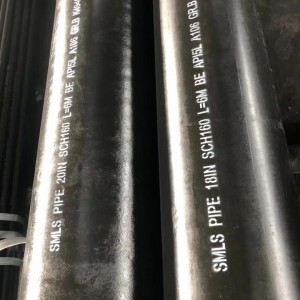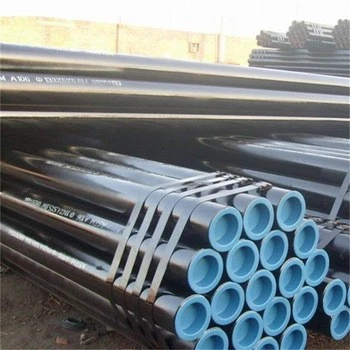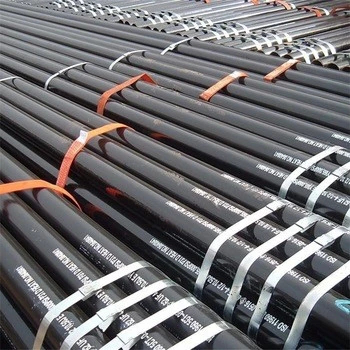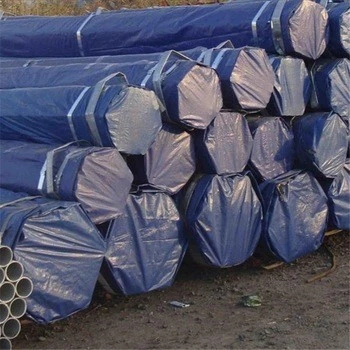Cold Drawn Seamless Pipe
Cold Drawn Seamless as implied is made by cold drawing a larger mother seamless pipe, which is generally manufactured through a HFS process. In the Cold Drawn Seamless process, the mother pipe is pulled through a die & plug in cold without any heating. Because of the tool on outside and inside the surface and tolerances are better in Cold Drawn Seamless. While this is an additional process over HFS, it is necessary to get smaller size pipes which otherwise cannot be manufactured in HFS. Some applications which require close tolerances and smooth surfaces also specify the requirements to be necessarily Cold Drawn Seamless.Cold Drawn Seamless pipes & tubes are extensively used in Heat-Exchanger, Bearing & Automotive sectors.
Cold drawn seamless steel pipe is used for the mechanical structure, hydraulic equipment ,which is have precision size ,good surface finish.It can greatly reduce mechanical processing hour and improve material utilization, and to improve the quality of products. High quality of cold draw seamless steel pipe are mainly use the 10# 20#.In addition to ensure chemical composition and mechanical properties,it will check by Hydrostatic test,crimping,flared and Squashed test.
Application & Specification (Seamless) :
|
Oil & Gas Sector |
|
|
API |
5L |
|
API |
5CT |
|
IS |
1978, 1979 |
|
Automotive Industry |
|
|
ASTM |
A-519 |
|
SAE |
1010, 1012, 1020, 1040, 1518, 4130 |
|
DIN |
2391, 1629 |
|
BS |
980, 6323 (Pt-V) |
|
IS |
3601, 3074 |
|
Hydrocarbon Process Industry |
|
|
ASTM |
A-53, A-106, A-333, A-334, A-335, A-519 |
|
BS |
3602,3603 |
|
IS |
6286 |
|
Bearing Industry |
|
|
SAE |
52100 |
|
Hydraulic Cylinder |
|
|
SAE |
1026, 1518 |
|
IS |
6631 |
|
DIN |
1629 |
|
Boiler, Heat Exchanger, Superheater & Condenser |
|
|
ASTM |
A-179, A-192, A-209, A-210, A-213, A-333, A-334,A-556 |
|
BS |
3059 (Pt-I Pt-II) |
|
IS |
1914, 2416, 11714 |
|
DIN |
17175 |
|
Railways |
|
|
IS |
1239 (Pt-I),1161 |
|
BS |
980 |
|
Mechanical, Structural General Engineering |
|
|
ASTM |
A-252, A-268, A-269, A-500, A-501, A-519, A-589 |
|
DIN |
1629, 2391 |
|
BS |
806, 1775, 3601, 6323 |
|
IS |
1161, 3601 |
Heat treatment of cold drawn seamless steel pipe:
(1)cold drawn steel annealing: refers to the metal material is heated to the appropriate temperature, to maintain a certain time, and then slowly cooled heat treatment process. Common annealing process are: recrystallization annealing, stress relieving, ball annealing, fully annealed and so on. The purpose of annealing: mainly to reduce the hardness of the metal material, to improve the plasticity, or cutting processing to Liqie pressure processing, reduce the residual stress and improve the uniformity of microstructure and composition, heat treatment, after possible or tissue preparation.
(2)cold drawn steel normalizing: refers to the heating of steel or steel to Ac3 or Acm (the critical temperature of steel) over 30 ~ 50 ℃, after an appropriate time to keep cool in still air in the heat treatment process . The purpose of normalizing: mainly to improve the mechanical properties of low carbon steel to improve machinability, grain refinement, elimination of tissue defects, prepare for the heat treatment, after tissue preparation.
(3)cold drawn steel hardening: refers to the heated steel Ac3 or Ac1 (lower critical temperature of steel) above a certain temperature for a certain time, then the appropriate cooling rate to obtain martensite (or shellfish Heat Treatment’s body) tissue. Common salt bath quenching process has hardened, martensitic quenching, Austempering, surface hardening and partial quenching. Quenching purpose: to make the steel needed to obtain martensite improve workpiece hardness, strength and wear resistance, heat treatment, after prepare for the organization and preparation.
(4)cold drawn steel tempered: that after hardened steel, and then heated to a temperature below Ac1, holding a certain time, and then cooled to room temperature, the heat treatment process. Common tempering process are: tempering, tempering, tempering and multiple tempering. The purpose of tempering: mainly steel eliminate stress produced during quenching, the steel having high hardness and wear resistance, but also has the required plasticity and toughness.
(5)cold drawn steel quenched: refers to the quenching and tempering of steel or composite steel heat treatment process. Used in quenching said steel quenched and tempered steel. It generally refers to the carbon structure of carbon steel and alloy steel.
(6)cold drawn steel chemical treatment: refers to the metal or alloy workpieces placed in a constant temperature of the active medium heat, so that one or several elements into its surface to change its chemical composition, microstructure and properties of the heat treatment process. Common chemical heat treatment process are: carburizing, nitriding, carbonitriding, aluminized boron penetration. The purpose of chemical treatment: The main is to improve the steel surface hardness, wear resistance, corrosion resistance, fatigue strength and oxidation resistance.
(7) cold drawn steel solution treatment: that the alloy is heated to a high temperature single-phase region to maintain a constant temperature, so that the excess phase fully dissolved into the solid solution after rapid cooling, in order to get over the supersaturated solid solution heat treatment process. The purpose of solution treatment: mainly to improve the ductility and toughness of steel and alloys, to prepare for the precipitation hardening treatment and so on.
| Cold Drawn Seamless Tube – Mechanical – BS 6323 Part 4 : 1982 CFS 3 | |||||||||||||||||||
| BS 6323 Part 4 : 1982 Bright-as-Drawn – CFS 3 BK Annealed – CFS 3 GBK | |||||||||||||||||||
| Wall | 0.71 | 0.81 | 0.91 | 1.22 | 1.42 | 1.63 | 2.03 | 2.34 | 2.64 | 2.95 | 3.25 | 4.06 | 4.76 | 4.88 | 6.35 | 7.94 | 9.53 | 12.70 | |
| O.D. | |||||||||||||||||||
| 4.76 | |||||||||||||||||||
| 6.35 | X | X | X | ||||||||||||||||
| 7.94 | X | X | X | X | |||||||||||||||
| 9.53 | X | X | X | X | X | X | X | ||||||||||||
| 11.11 | X | X | X | X | X | ||||||||||||||
| 12.70 | X | X | X | X | X | X | X | ||||||||||||
| 14.29 | X | X | X | X | X | X | X | X | |||||||||||
| 15.88 | X | X | X | X | X | X | X | X | X | ||||||||||
| 17.46 | X | X | X | X | |||||||||||||||
| 19.05 | X | X | X | X | X | X | X | X | X | ||||||||||
| 20.64 | X | X | X | ||||||||||||||||
| 22.22 | X | X | X | X | X | X | X | X | X | X | |||||||||
| 25.40 | X | X | X | X | X | X | X | X | X | X | X | ||||||||
| 26.99 | X | X | X | X | X | ||||||||||||||
| 28.58 | X | X | X | X | X | X | X | X | X | ||||||||||
| 30.16 | X | X | X | ||||||||||||||||
| 31.75 | X | X | X | X | X | X | X | X | X | ||||||||||
| 33.34 | X | X | |||||||||||||||||
| 34.93 | X | X | X | X | X | X | X | X | X | X | |||||||||
| 38.10 | X | X | X | X | X | X | X | X | X | ||||||||||
| 39.69 | X | X | |||||||||||||||||
| 41.28 | X | X | X | X | X | X | X | X | X | ||||||||||
| 42.86 | X | X | |||||||||||||||||
| 44.45 | X | X | X | X | X | X | X | X | X | ||||||||||
| 47.63 | X | X | X | X | X | X | |||||||||||||
| 50.80 | X | X | X | X | X | X | X | X | X | X | |||||||||
| 53.98 | X | X | X | X | X | ||||||||||||||
| 57.15 | X | X | X | X | X | X | X | ||||||||||||
| 60.33 | X | X | X | X | X | X | X | ||||||||||||
| 63.50 | X | X | X | X | X | X | X | X | |||||||||||
| 66.68 | X | X | X | ||||||||||||||||
| 69.85 | X | X | X | X | X | X | X | ||||||||||||
| 73.02 | X | ||||||||||||||||||
| 76.20 | X | X | X | X | X | X | X | X | X | ||||||||||
| 79.38 | X | ||||||||||||||||||
| 82.55 | X | X | X | X | X | ||||||||||||||
| 88.90 | X | X | X | X | |||||||||||||||
| 95.25 | X | X | |||||||||||||||||
| 101.60 | X | X | |||||||||||||||||
| 107.95 | X | X | |||||||||||||||||
| 114.30 | X | X | |||||||||||||||||
| 127.00 | X | X | |||||||||||||||||
| Cold Drawn Seamless Tube – Mechanical | |||||||||||||||||||
| Cold Drawn Seamless tube for Hydraulic & Pneumatic Lines – BS 3602 Part 1 CFS Cat 2 Alternatively Din 2391 ST 35.4 NBK | ||||||||||||||||||||
| BS 3602 Part 1 CFS Cat 2 Alternatively Din 2391 ST 35.4 NBK | ||||||||||||||||||||
| Wall | 0.91 | 1.00 | 1.22 | 1.42 | 1.50 | 1.63 | 2.00 | 2.03 | 2.50 | 2.64 | 2.95 | 3.00 | 3.25 | 3.66 | 4.00 | 4.06 | 4.88 | 5.00 | 6.00 | |
| O.D. | ||||||||||||||||||||
| 6.00 | X | X | X | |||||||||||||||||
| 6.35 | X | X | X | |||||||||||||||||
| 7.94 | X | X | X | |||||||||||||||||
| 8.00 | X | X | X | |||||||||||||||||
| 9.52 | X | X | X | X | X | |||||||||||||||
| 10.00 | X | X | X | |||||||||||||||||
| 12.00 | X | X | X | X | X | |||||||||||||||
| 12.70 | X | X | X | X | X | |||||||||||||||
| 13.50 | X | |||||||||||||||||||
| 14.00 | X | X | X | X | ||||||||||||||||
| 15.00 | X | X | X | X | X | |||||||||||||||
| 15.88 | X | X | X | X | X | X | ||||||||||||||
| 16.00 | X | X | X | X | ||||||||||||||||
| 17.46 | X | |||||||||||||||||||
| 18.00 | X | X | X | |||||||||||||||||
| 19.05 | X | X | X | X | X | |||||||||||||||
| 20.00 | X | X | X | X | X | |||||||||||||||
| 21.43 | X | X | ||||||||||||||||||
| 22.00 | X | X | X | X | ||||||||||||||||
| 22.22 | X | X | X | X | X | |||||||||||||||
| 25.00 | X | X | X | X | X | |||||||||||||||
| 25.40 | X | X | X | X | X | |||||||||||||||
| 26.99 | X | |||||||||||||||||||
| 28.00 | x | x | x | X | ||||||||||||||||
| 30.00 | X | X | X | X | X | |||||||||||||||
| 31.75 | X | X | X | X | X | |||||||||||||||
| 34.13 | X | |||||||||||||||||||
| 34.93 | X | |||||||||||||||||||
| 35.00 | X | X | X | X | ||||||||||||||||
| 38.00 | X | X | X | X | X | |||||||||||||||
| 38.10 | X | X | X | |||||||||||||||||
| 42.00 | X | X | ||||||||||||||||||
| 44.45 | X | X | ||||||||||||||||||
| 48.42 | X | |||||||||||||||||||
| 50.00 | X | |||||||||||||||||||
| 50.80 | X | X | X | X | X | |||||||||||||||
| Cold Drawn Seamless tube for Hydraulic & Pneumatic Lines | ||||||||||||||||||||
Phosphate coating for drawing of tubing are now formed with weights of 4-10
g/m². This has improved the efficiency of the surface treatment and, at the same time, avoided the adverse effectswhich act in the first drawing stage where coarser-crystalline phosphate coating are found. The most suitable coatingis based on nitrate/nitrite accelerated zinc hosphate, formed at 40-75°C. At the upper end of this temperature range,the option exists to use self-dosing nitrate type systems. Chlorate accelerated zinc phosphate baths are also found. In all cases, the preferred form of the phosphate for cold drawing of tube and section is strongly adherent but softstructured. In the drawing of welded tubing, the seam must first be ground down. In the case of smaller diametertubing, this is not possible inside the welding machine. In some cases, there may be a deformation to give a particular cross-section. Since, as a rule, less severe deformations can be tolerated by welded, as opposed to
seamless tubing, the use of phosphating is widespread, coating weights being of the order 1.5 – 5 g/m². These are mostly based on zinc phosphate baths operated between 50 and 75 °C with additives used to promote thinner coatings.Phosphating is also used for tubing of un-alloyed or low-alloyed steel with chromium content up to 4-6%.Such coatings offer a number of advantages, all arising from reduced metal-to-metal contact between tubes and die. Thus, cold welding damage, leading to grooving or crack formation, is minimized, tool and die life is extended and higher drawing rates may be used. Zinc phosphate coating also allows a greater degree of reduction per pass.
Surface treatment is carried out by immersion along the following lines:
• Alkaline degreasing.
• Water rinse.
• Pickling in sulphuric or hydrochloric acid.
• Water rinse.
• Neutralising pre-rinse.
• Phosphating.
• Water rinse
• Neutralising rinse.
• Lubrication.
• Drying and storage.

